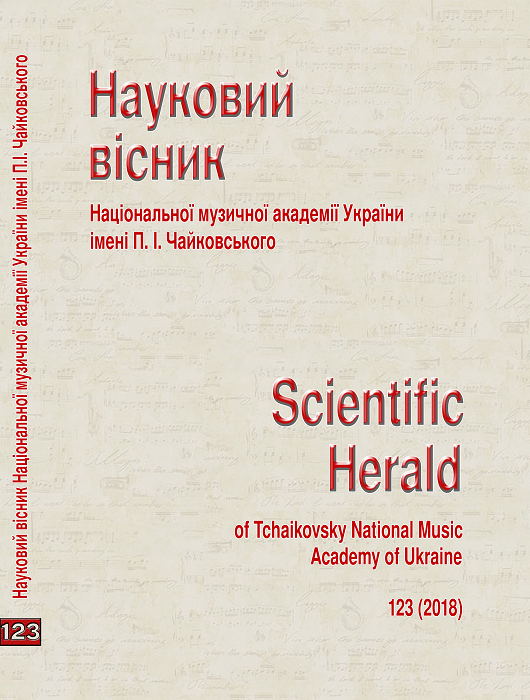National musical traditions in the piano oeuvre of Joaquin Turina
DOI:
https://doi.org/10.31318/2522-4190.2018.123.152424Keywords:
the oeuvre of J. Turina, folklore, national traditions, Renacimiento, patternAbstract
Relevance of the study. In the modern musical continuum, the tendency to search for a terra incognita – the discovery of unexplored pages in the history of musical art – projects the works, facts, names of little-studied or little-known composers into the focus of musicology and performing practice. One of these is the Spanish composer Joaquin Turina (1881–1949), whose creativity occupies a prominent place in the musical culture of Spain (he wrote a little more than a hundred opuses), but undeservedly remains poorly researched in the Ukrainian musicology. It determines the relevance of the study and open up the scientific perspectives for the first investigations in this direction for the author of the article.
Main objective of the study. The aim of the article is to highlight the peculiarities of the embodiment of national traditions in the piano creativity of J. Turina through defining and structuring the characteristic Spanish stylistic figures of the musical language – patterns.
Methodology of the study. To achieve this goal, the following scientific approaches were used: historiographic (for studying historical research on this issue), bibliographic (for compiling a list of sources and books, their scientific description), historical typological (for clarifying the Renacimiento period in Spain) and analytical (for identifying the Spanish stylistic figures of the musical language in the work).
Results and conclusions. Systematic appeal of the composers of Spain to folk sources helped to determine the following professional methods of the embodiment of Spanish folklore into musical themes: citing and associative. J. Turina in the “Symphonic Rhapsody” applies the second method, which is inextricably linked with the use of characteristic patterns. The results of the study are perspective in the field of research of the Spanish and world musical culture; they can be extrapolated to the works of both national and foreign composers who turn to the Spanish folklore sphere in their works.
References
Golovinskiy, G. (1981), Kompozitor i folklor: Iz opyita masterov XIX–XX vekov. Ocherki [in Russian] [Composer and folklore: The experience of the masters of the XIX–XX centuries. Essays]. Moscow: Muzyika. 279 p.
Debyussi, K. (1964), Stati. Retsenzii. Besedyi [in Russian] [Articles. Reviews. Conversations]. Moscow, Leningrad: Muzyika. 278 p.
Zemtsovskiy, I. (1978), Folklor i kompozitor. Teoreticheskie etyudyi [in Russian] [Folklore and composer. Theoretical studies]. Leningrad: Sov. Kompozitor. 176 p.
Martyinov, I. (1977), Muzyika Ispanii [in Russian] [The Music of Spain]. Moscow: Sov. Kompozitor. 376 p.
Ossovskiy, A. (1961), Ocherk istorii ispanskoy muzyikalnoy kulturyi [in Russian] [An Essay on the history of Spanish music culture]. Leningrad : Sov. Kompozitor. pp. 227–288.
Busto, J., del. (2009), Joaquín Turina. [online] Available at: http://www.orcam.org. [Accessed 25 Nov. 2016].
Fundación Juan March (1991), Joaquín Turina, a través de otros escritos. Un repertorio de escritos dedicados al músico sevillano en el transcurso de casi un siglo por Alfredo Morán. Biblioteca de Música Española Contemporánea. Madrid : Ediciones Peninsular. Tomelloso, 37. 28026 Madrid. 260 p.
Marco, T. (1993), Spanish Music in the Twentieth Century. Cambridge, Massachusetts. London, England: Harvard University Press. 288 p.
Op. 66 Rapsodia sinfónica. Ciclo pianístico, V. (1931), [online]. Archivo Joaquín Turina. Available at: http://www.joaquinturina.com/opus66.html. [Accessed 10 Oct. 2017].


